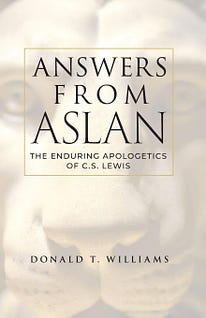By Donald T. WilliamsWhy do we need apologetics? We live in a world filled with people who think like Trumpkin: “I have no use for magic lions which are talking lions and don’t talk, and friendly lions though they don’t do us any good, and whopping big lions though nobody can see them.”[1] The only cure for that attitude was for Trumpkin actually to meet Aslan. Well, we are all of us constitutionally unbelieving Narnian dwarfs. “You see,” said Aslan. “They will not let us help them. They have chosen cunning instead of belief. Their prison is only in their own minds, yet they are in that prison; and are so afraid of being taken in that they cannot be taken out.”[2] Only the Holy Spirit can take us out of ourselves, out of those internal prisons, to the point that we can hear the evidence for Christ and respond to it with faith. But the Spirit wants us to be ready and able to present that evidence when He does so. Lewis’s friend Austin Farrer put it well: “Though argument does not create conviction, the lack of it destroys belief. What seems to be proved may not be embraced; but what no one shows the ability to defend is quickly abandoned. Rational argument does not create belief, but it maintains a climate in which belief can flourish.”[3] Lewis, in other words, well understood that the goal of apologetics is not just to win arguments. It must be what he allowed to Sherwood Eliot Wirt was the goal of all his writing: “to bring about an encounter of the reader with Jesus Christ,” the kind of encounter Lewis described so well: “There comes a moment when people who have been dabbling in religion (‘Man’s search for God’) suddenly draw back. Supposing we really found him? We never meant it to come to that! Worse still, supposing he found us?”[4] The purpose of apologetics then is to help people channel the shock of that encounter into a serious consideration of the claims of Christ. It is to ensure that this encounter is with the Christ of history and not a counterfeit, that it is an encounter of the whole person with that Christ, and that the faith we hope these people will put in Him will be a rational and well-considered and well-grounded faith. It is to help believers whose faith is more fragmented and superficial grow into that rational, well-considered, and well-grounded faith themselves so that they may be preserved in it.[5] It is to remind them in their inevitable moments of doubt that faith is “the art of holding onto things your reason has once accepted, in spite of your changing moods.”[6] The goal is not just to win arguments. It matters little that we persuade people that theism is true in the abstract unless this enables them to meet God. Lewis reminds us, “We trust not because ‘a God’ exists, but because this God exists.”[7] We want to get people to the place where “What would, a moment before, have been variations in opinion, now become variations in your personal attitude to a Person. You are no longer faced [simply] with an argument which demands your assent, but with a Person who demands your confidence.”[8] For if indeed they can be brought to see the glory of God in the face of Jesus Christ, they will be ready to say with Orual, “You are yourself the answer. Before your face questions die away.”[9] … Lewis had the gift of enabling people who are not professional academics to think on a level that would otherwise have been inaccessible to them. He can still do that for some. He also lets those of us who have some academic training make more and better use of it than we could have made without his help. These gifts, combined with the excellence of his apologetic and literary works in their own right, make him the place to start in learning to do apologetics, even now that many of his seminal works are eight decades old. But while Lewis is still a good place to start, he was never a good place to stop. He is less so now than ever, due to that passage of time. So we have tried to bring out the virtues of his arguments and highlight what we can learn from them about doing our own apologetic in our own voice for our own times. Our own apologetic in our own voice for our own times: If Lewis could have imagined in his life that almost a century later, he would still be helping us with that, he would have been astonished. And if he could have believed it, I think he would have been pleased. And so, I believe, would his Lord. Notes [1] C. S. Lewis, Prince Caspian (NY: HarperCollins, 1979), 156. [2] C. S. Lewis, The Last Battle (NY: HarperCollins, 1984), 185–6. [3] Austin Farrer, “The Christian Apologist,” in Light on C. S. Lewis, ed. Jocelyn Gibb (NY: Harcourt, Brace, & World, 1965), 26. [4] C. S. Lewis, Miracles: A Preliminary Study (NY: MacMillan, 1947), 96–7. [5] For ways to reform the church’s ministry so that it can better foster such healthy faith in its Christian nurture, see Donald T. Williams, Ninety-Five Theses for a New Reformation, op. cit., 146–64, 312–48, 372–406. [6] Mere Christianity, op. cit., 123.n [7] C. S. Lewis, “On Obstinacy in Belief,” in The World’s Last Night and other Essays (NY: Harcourt, Brace & World, 1960), 25. [8] Ibid., 26. [9] C. S. Lewis, Till We Have Faces: A Myth Retold (Harcourt Brace & World, 1956; rpt. Grand Rapids, MI: Eerdmans, 1968), 308. — Donald T. Williams (PhD, The University of Georgia) is a border dweller, camped out on the borders between theology and literature, serious scholarship and pastoral ministry, Narnia and Middle Earth. A past president of the International Society of Christian Apologetics and the author eleven books, he serves as R. A. Forrest Scholar at Toccoa Falls College in the hills of NE Georgia. --- Excerpted from Answers from Aslan: The Enduring Apologetics of C.S. Lewis by Donald T. Williams (DeWard, 2023). Used by permission. “Donald Williams makes a unique, helpful, and skillful contribution to the literature on Lewis in particular and apologetics in general. I plan to use Answers from Aslan as a textbook the next time I teach The Apologetics of C.S. Lewis, and I heartily endorse it for anyone interested in this subject.” — Douglas Groothuis, Professor of Philosophy, Denver Seminary, and author of Beyond the Wager: The Christian Brilliance of Blaise Pascal and Christian Apologetics, 2nd ed. “What a splendid, elegant, and practical book Answers from Aslan is! On the writing of books on C.S. Lewis there seems to be no end, yet this book makes a unique and valuable contribution not only to the field of Lewis studies but also to the field of Christian apologetics.” — Robert B. Stewart, Professor of Philosophy and Theology and Greer-Heard Chair of Faith and Culture, New Orleans Baptist Theological Seminary Find Answers from Aslan at Amazon. |











